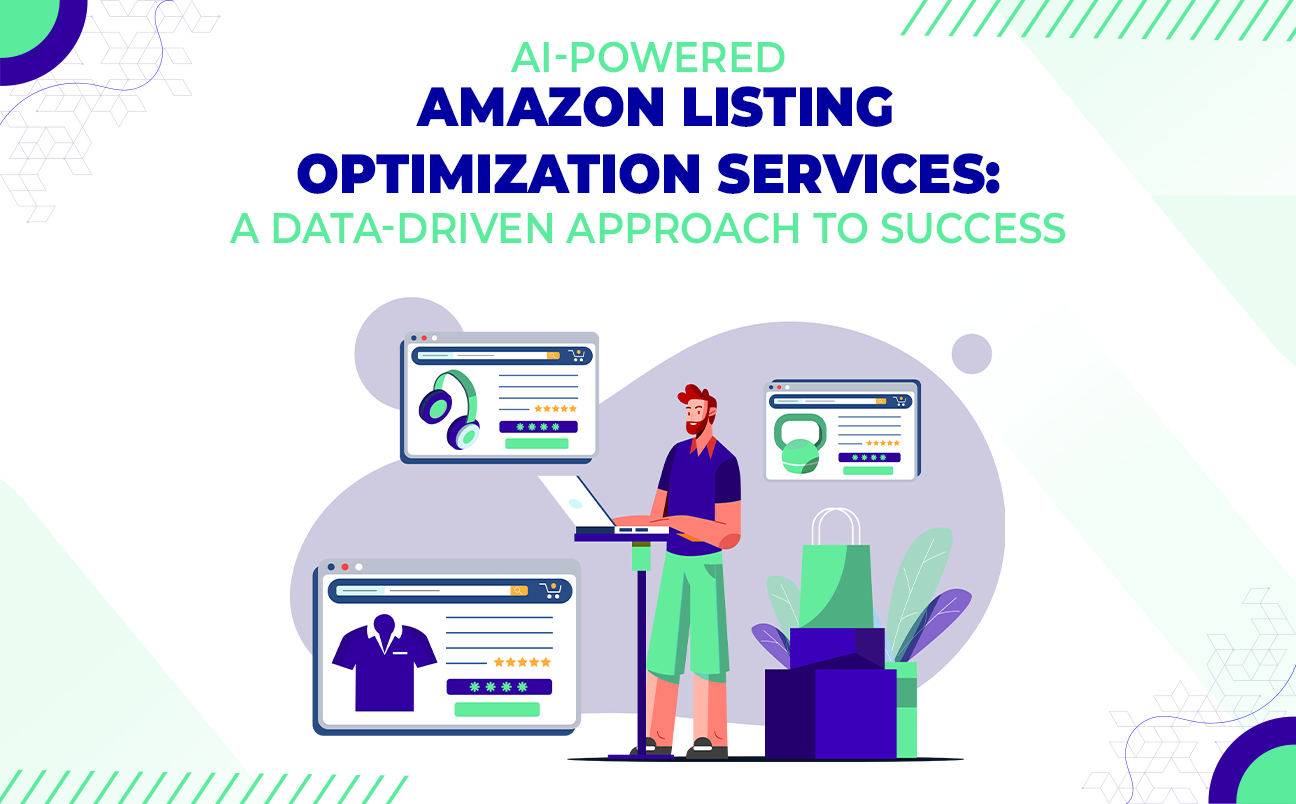Imagine experiencing the future of e-commerce, where artificial intelligence (AI) enhances your online shopping experience to make it truly magical. AI is your trusted advisor as you navigate the world of e-commerce platforms, quickly curating personalized recommendations, increasing conversions, and improving customer satisfaction. The e-commerce sector is poised for an unprecedented upheaval thanks to AI’s prowess and the emergence of cutting-edge Amazon advertising agency providing Amazon listing optimisation services, where businesses can captivate customers and prosper in the digital space like never before.
Come with us to discover the intriguing connection between AI and e-commerce. Witness how this powerful combination transforms the rules of the digital marketplace. In this article, we explore the revolutionary benefits of AI on customer experiences, operational effectiveness, and company growth as it relates to e-commerce platforms.
What is AI?
Artificial intelligence is known as AI. It refers to creating computer systems or other devices capable of carrying out operations that ordinarily demand human intelligence. AI uses algorithms and processing power to mimic human cognitive abilities like learning, problem-solving, reasoning, and decision-making.
The two main categories of AI are general AI and narrow AI. Narrow AI, also called weak AI, is made to carry out particular tasks inside a constrained domain. Siri and other voice assistants, streaming platforms’ recommendation engines, and image recognition software are all examples of limited AI.
Contrarily, general AI, commonly referred to as strong AI or AGI (Artificial General Intelligence), describes AI systems with cognitive abilities comparable to those of humans, including the capacity to comprehend, acquire, and apply knowledge across various topics. General AI aspires to have cognitive powers and adaptability similar to humans. Although narrow AI has come a long way, establishing universal AI is still tricky.
Symbolic AI and machine learning are the two main categories of AI approaches. Symbolic AI uses predetermined rules and reasoning to carry out tasks. On the other hand, machine learning focuses on creating algorithms that can absorb knowledge from data and enhance their performance over time.
The growth and development of AI continue to change industries and spur innovation across a wide range of fields. Numerous industries, including e-commerce, healthcare, banking, transportation, entertainment, and more, use AI in some capacity. It fuels robotics, computer vision, autonomous driving, virtual assistants, and robotics innovations.
How is AI Transforming the E-commerce Sector?
The e-commerce sector’s future significant factor is artificial intelligence (AI). Though AI solutions have been present for a while, new technological advancements have made integrating them into the e-commerce sector simpler.
Increased consumer happiness, cheaper costs, and more effective procedures are just a few ways the e-commerce sector demonstrates its benefits. Furthermore, between 2020 and 2027, AI is predicted to expand by 33.2% annually.
You may give clients an AI-powered personalized search feature to boost their brand loyalty and aid in the faster growth of your company.
5 Ways Artificial Intelligence Revolutionizes the E-commerce
The e-commerce industry is being transformed by Artificial Intelligence (AI) in significant ways. Here are four ways in which AI is impacting the industry:
- Personalization and Recommendations: AI algorithms can analyze vast customer data, such as browsing history, purchase behavior, and preferences, to deliver highly personalized product recommendations. E-commerce platforms utilize AI-powered recommendation engines to suggest relevant products, increase cross-selling and upselling opportunities, and enhance customer satisfaction. By understanding individual customer preferences, AI can offer personalized shopping experiences, increase customer engagement, and drive sales.
- Chatbots and Virtual Assistants: E-commerce companies use AI-powered chatbots and virtual assistants to offer round-the-clock customer care and help. These conversational AI systems can process orders, understand natural language, provide product recommendations, instantaneously respond to consumer inquiries, and do simple customer service activities. Chatbots can increase operational efficiency by boosting customer experience, speeding up response times, and handling numerous enquiries simultaneously.
- Visual Search and Image Recognition: AI technologies make visual search and image recognition possible, allowing consumers to do product searches using images rather than word queries. By allowing customers to find desired products based on visual characteristics, such as color, shape, or pattern, instead of just text-based descriptions, visual search improves the user experience. E-commerce platforms can use machine learning and computer vision to analyze product photos and find visually similar items in their inventory.
- Supply Chain Optimization: AI can improve several facets of the e-commerce supply chain, from inventory management to demand forecasting and logistics. Machine learning algorithms can analyze historical sales data, market trends, and outside influences to estimate demand accurately. It aids e-commerce companies in order fulfillment, stockout minimization, and inventory optimization. AI-powered algorithms can also improve the efficiency of the supply chain overall, optimize delivery routes, expedite logistical processes, and increase overall customer happiness.
- AI-Powered Copywriting Assistance: Copywriters get help from AI tools and NLP skills to produce persuasive product descriptions, SEO optimized Amazon A+ content, engaging ad copy, and marketing material. AI can analyze enormous volumes of data, including competition information, customer feedback, and product specifications, to create product descriptions and advertising content that appeals to buyers. With AI-powered copywriting tools, copywriters may expedite their creative process and produce high-quality copy more quickly by receiving suggestions for bettering headlines, language optimization, and content customization to specific target audiences.
These are just a few instances of AI revolutionizing the e-commerce sector. As AI technology develops, we can anticipate more innovation and AI’s incorporation into other facets of e-commerce, which will ultimately change how businesses run and how customers shop online.
How Does AI Help E-commerce?
Previously, e-commerce websites were created to boost sales and conversion rates. The idea was that customers would be more likely to shop on a website if it was user-friendly and offered everything they needed.
With modern technology, websites can now utilize artificial intelligence to understand their visitors better as they interact with the site. It allows for a unique shopping experience for online retail customers unlike anything previously seen.
E-commerce websites are now an extension of the consumer experience, adding value and building individualized experiences for each customer. Artificial intelligence (AI) now allows us to answer customer inquiries before they even ask. Additionally, users can get answers without spending time on hold or talking with support agents.
Amazon Listing Optimization Services by AI
Product listing optimization using AI can greatly benefit e-commerce companies. It offers several advantages that can aid in their growth. Beneath are some of the significant benefits of using AI for product listing optimization:
- Improved Keyword Research: AI-powered technologies can quickly research extensive data to find the most pertinent and practical keywords for a product listing. Businesses may gain insightful information, optimize product titles, descriptions, and backend keywords, and raise their search exposure on websites like Amazon by utilizing AI for keyword research. Higher conversion rates and more organic traffic may result from this.
- Data-Driven Decision Making: Artificial intelligence (AI)-powered solutions can make insightful recommendations on product features, pricing, and content strategies, allowing firms to remain competitive and adjust to shifting market dynamics. Making decisions based on data: AI algorithms can analyze a wide range of data, including market trends, consumer behavior, and competitor insights. Businesses can use this data to optimize product listings by using data-driven judgements.
- Improved Conversion Rates: AI can assist organizations in understanding client preferences, sentiment analysis, and purchasing trends. AI-powered solutions can produce insights to optimize product listings and raise conversion rates by examining customer data and behavior. This includes improving product descriptions, highlighting unique selling qualities, and optimizing product photos to appeal to target buyers and increase sales.
- Continuous Optimization: AI-driven tools may continuously monitor and improve product listings. These solutions offer real-time insights while tracking essential metrics, including click-through rates (CTR), conversion rates, and customer ratings. Businesses may continuously improve their product listings using AI-driven optimization based on performance data to keep them exciting and relevant for customers.
- Efficiency in Time and Money: Using AI-powered automation to optimize product listings can save companies significant time and resources. AI-powered tools can streamline workflow, enabling quicker and more effective listing development and optimization. By doing this, businesses gain vital time to focus on other essential facets of their operations, like marketing, customer support, and product development.
Conclusion
The industry is prepared to experience significant change due to the integration of AI into e-commerce platforms like Amazon. How users interact with online markets will change due to AI technology like personalized suggestions, advanced customer support provided by chatbots, and visual search capabilities. AI-powered supply chain optimization and fraud protection strategies will improve operations and enhance security. Businesses can benefit from the latest developments by partnering with a professional Amazon management agency such as HRL Infotech. As an Amazon listing service provider and management agency, HRL Infotech is well-equipped to navigate the evolving landscape, leverage AI technologies, and drive success for businesses in the competitive e-commerce market.






